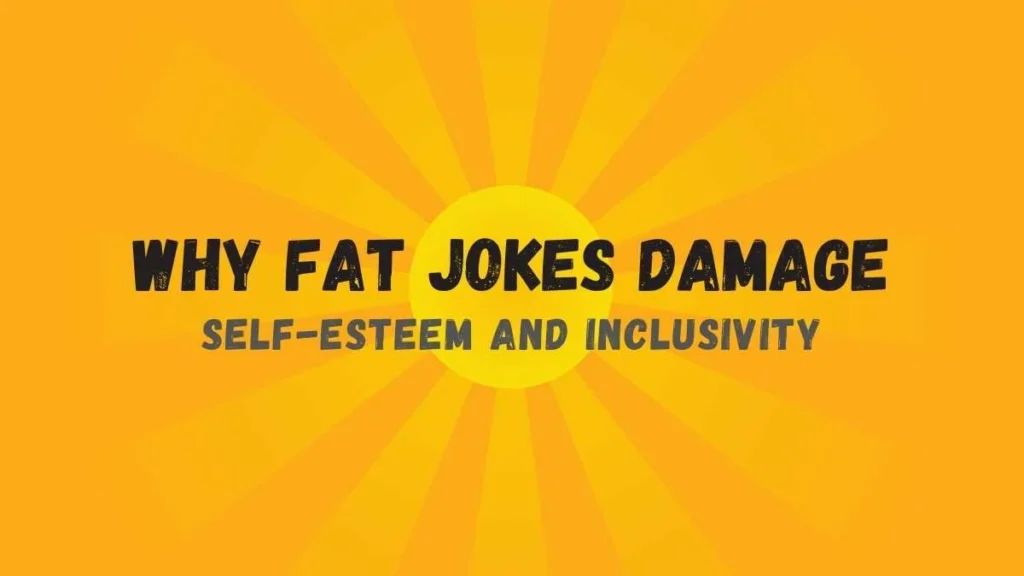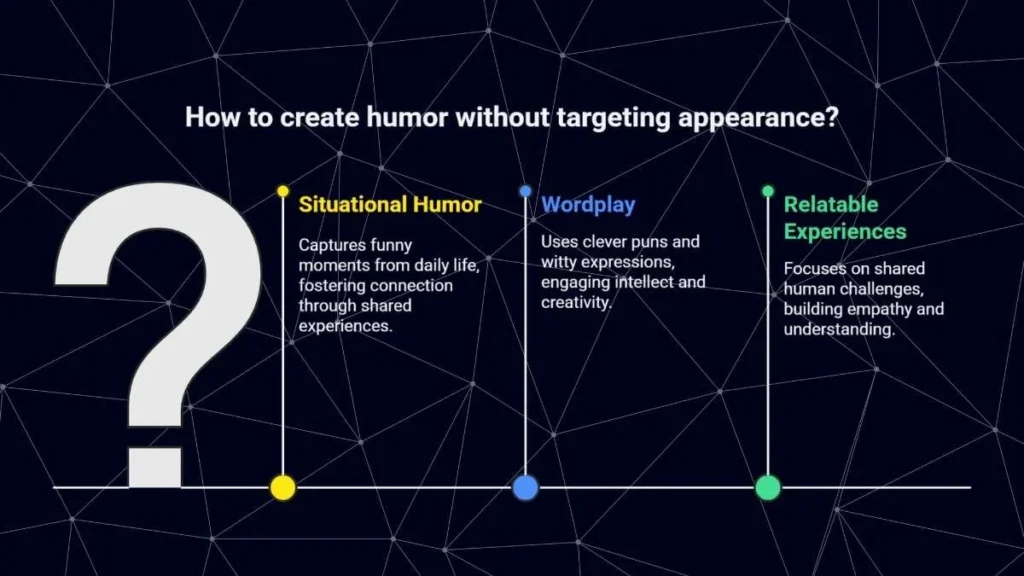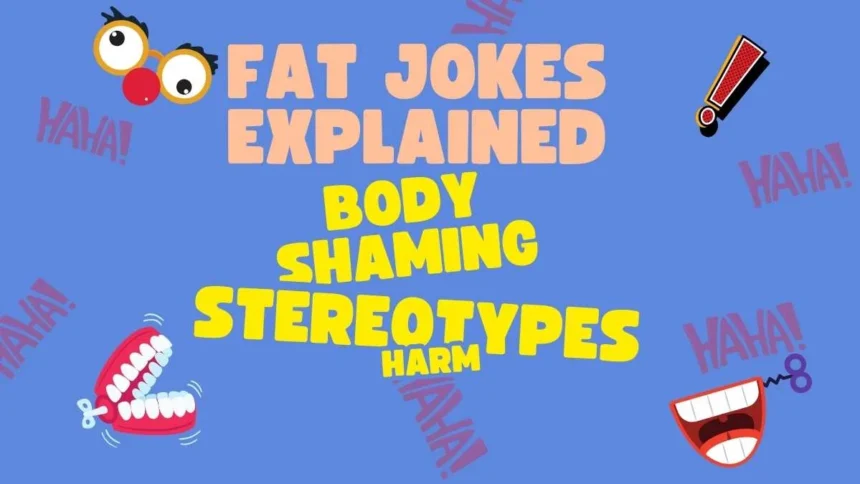Fat jokes are jokes or remarks that target a person’s weight or body size, often exaggerating stereotypes that depict overweight individuals as lazy, unhealthy, or lacking self-control. While some may present them as lighthearted humor, fat jokes are generally offensive and harmful because they can damage confidence, encourage bullying, and reinforce negative cultural attitudes about appearance.
In reality, fat jokes are not harmless fun but a form of weight stigma that contributes to body-shaming and discrimination. By normalizing body-related ridicule, these jokes create social and psychological harm that extends beyond individuals, affecting communities and public health narratives. Understanding the true impact of fat jokes helps us recognize why respectful humor and inclusivity matter in building healthier societies.
Where Fat Jokes Come From
Weight-based humor has long been a feature in media, comedy shows, and everyday conversations. Characters with larger bodies are often presented as clumsy, overly indulgent, or simply there for comic relief. This repeated portrayal has normalized the idea that body size is a fair target for humor.
Common stereotypes behind fat jokes include:
- Equating size with laziness or poor discipline.
- Assuming overweight individuals are automatically unhealthy.
- Using body shape as a quick source of comedic punchlines.
Why This Form of Humor Is Harmful

1. Damaging Self-Esteem and Mental Health
Fat jokes attack an aspect of identity that is highly visible and often sensitive. For many, weight is tied to self-worth due to societal pressure. Hearing constant jokes about body size can lead to:
- Low self-esteem
- Increased body dissatisfaction
- Social anxiety and withdrawal
- Depression
2. Encouraging Bullying and Harassment
What begins as a “lighthearted joke” often gives others a license to bully. Weight-based teasing is one of the most common forms of bullying in schools. It is also prevalent in workplaces, where employees may face subtle remarks or outright discrimination because of their body size. Over time, such behavior fosters hostile environments where individuals feel unsafe or undervalued.
3. Reinforcing Negative Societal Attitudes
Fat jokes contribute to a culture where body size is equated with worth. By normalizing these jokes, society implicitly accepts the idea that mocking someone for their body is permissible. This not only affects individuals but also undermines broader efforts to promote inclusivity, respect, and diversity.
Psychological Effects of Repeated Ridicule
Constant exposure to fat jokes often leads to internalized stigma. This occurs when people begin to believe the stereotypes they hear about themselves.
Internalized stigma can cause:
- Avoidance of social settings.
- Development of disordered eating patterns.
- Stress-related health issues, such as hypertension.
Effects of Fat Jokes on Individuals and Society
| Area of Impact | Short-Term Effects | Long-Term Consequences |
| Self-Esteem | Embarrassment, hurt feelings | Persistent low confidence, self-blame |
| Mental Health | Stress, anxiety | Depression, eating disorders, and social isolation |
| Social Environment | Awkwardness, peer teasing | Bullying, workplace discrimination |
| Cultural Attitudes | Normalization of stereotypes | Entrenched stigma and exclusion |
Why “It’s Just a Joke” Doesn’t Work
Supporters of fat jokes often defend them with statements like, “Don’t take it seriously, it’s just humor.” But humor is not neutral; it reflects and spreads cultural ideas.
If similar jokes were made about race, religion, or disability, most people would consider them unacceptable. Body size should not be treated differently. Dismissing fat jokes as harmless ignores the harm they perpetuate and the stigma they normalize.
Building a Culture of Respect and Inclusivity
To move beyond fat jokes, society must actively create environments that value inclusivity. This involves changes on multiple levels:
1. Individual Responsibility
- Think before joking: Ask whether humor comes at the expense of someone’s dignity.
- Challenge stereotypes: Speak up when fat jokes are made in social settings.
- Educate yourself: Learn about weight stigma and its impact on mental health.
2. Educational Institutions
Schools should implement anti-bullying programs that explicitly address weight-based teasing. Teachers and administrators must model respectful behavior and intervene when fat jokes occur.
3. Workplaces
Organizations can establish policies that prohibit weight-based discrimination and harassment. Diversity and inclusion training should include discussions about body image.
Healthier Alternatives for Humor
Not all humor harms. Jokes can connect people without targeting appearance. Safer approaches include:
- Situational humor: Funny moments from daily life.
- Wordplay: Clever puns and witty expressions.
- Relatable experiences: Shared human challenges that do not target physical features.

FAQs
Q1: Are fat jokes considered bullying in schools?
Yes, repeated weight-based jokes fall under verbal bullying and can have long-term effects on students’ well-being.
Q2: Can fat jokes affect workplace productivity?
Yes, employees who face weight-based ridicule often report lower morale, reduced productivity, and higher absenteeism.
Q3: Do cultural differences affect how fat jokes are perceived?
Absolutely. In some cultures, larger bodies are valued differently, but ridicule based on weight still creates stigma and exclusion.
Conclusion
Fat jokes may seem small, but their impact is significant. They damage confidence, spread stereotypes, and normalize exclusion. By recognizing the harm and replacing ridicule with respect, we create a culture where humor uplifts rather than wounds.
The challenge is simple but essential: everybody deserves dignity, and laughter should never come at the cost of someone’s humanity. Choosing healthier forms of humor is not just kinder, it is smarter for building inclusive, supportive communities.






